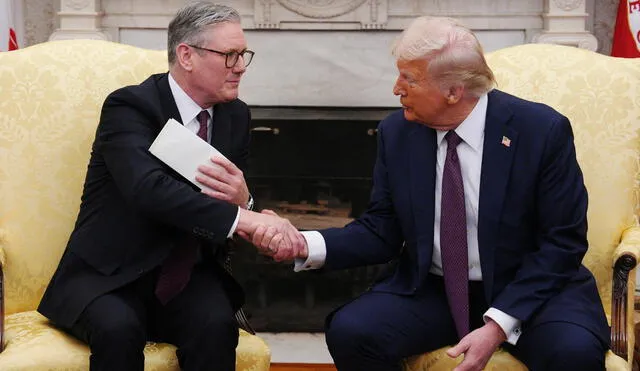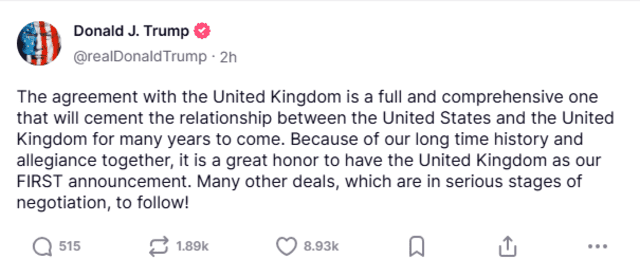Trump and UK finalize first post-tariff trade deal
As Trump champions a bold new trade pact with the UK, political divisions, global scrutiny, and questions about transparency and climate impact reveal the complex road ahead.

President Donald Trump announced a "full and comprehensive" trade agreement with the United Kingdom, marking his administration's first major trade deal since imposing sweeping tariffs in April. The announcement was made via social media, with a formal press conference scheduled for 10 a.m. ET in the Oval Office. While specific details of the agreement were not immediately disclosed, the deal is seen as a significant development amid ongoing global trade tensions.
In April, the Trump administration implemented a 10% tariff on all imported goods, along with “reciprocal tariffs” targeting countries with significant trade imbalances with the U.S. These tariffs triggered sharp market reactions and raised concerns among American businesses and global allies. The measures were framed as a way to protect U.S. manufacturing and reduce dependence on foreign products.
U.S.-UK trade deal aims to cut tariffs, boost exports in key sectors amid global uncertainty
The new U.S.-UK trade deal includes commitments to lower certain tariffs and expand market access for key industries. According to a White House spokesperson, the agreement aims to boost exports in agriculture, manufacturing, and technology. It also outlines a framework for regulatory cooperation and dispute resolution. Although the text of the deal is still pending publication, officials from both nations have expressed optimism. British Prime Minister Rishi Sunak praised the deal as “a new era in transatlantic commerce.”

A historic trade agreement with the United Kingdom marks the beginning of a new era of cooperation. This first announcement sets the stage for many more deals to strengthen our global partnerships. Photo: Donald Trump Truth social account
Economists are cautiously optimistic about the deal’s potential to stabilize trade relations after weeks of uncertainty. Market indices showed slight gains following the announcement, suggesting investor confidence in the direction of U.S. trade policy. Some analysts, however, warned that broader concerns remain, particularly with key trading partners like China and the European Union. Still, the UK deal could serve as a model for future bilateral agreements. Trump is reportedly in early talks with Japan and Brazil for similar arrangements.

ALSO SEE: Who is Daniel DiNardo? The Texas cardinal participating in the 2025 Conclave papal election
Trump’s U.S.-UK trade deal sparks mixed reactions, highlights 'America First' strategy on global stage
Reactions on Capitol Hill were mixed, with Republicans praising the president’s leadership and Democrats demanding more transparency. Some lawmakers requested a congressional review of the deal before full implementation. Trade unions voiced support for provisions protecting U.S. jobs, while environmental groups questioned the lack of climate-related clauses. As debate continues, the White House emphasized that the agreement reflects Trump’s “America First” trade philosophy. The administration plans to release a full briefing on the agreement’s terms in the coming days.
In the international arena, the deal is likely to bolster Trump’s image as a negotiator willing to use tariffs as leverage. European leaders responded with caution, emphasizing the need for unity among U.S. allies. The World Trade Organization has not yet commented on the agreement, but observers expect scrutiny regarding its compliance with global trade rules. Trump’s allies hailed the move as a victory against what they call unfair trade practices. Whether the deal marks a shift toward sustainable trade reform remains to be seen.












